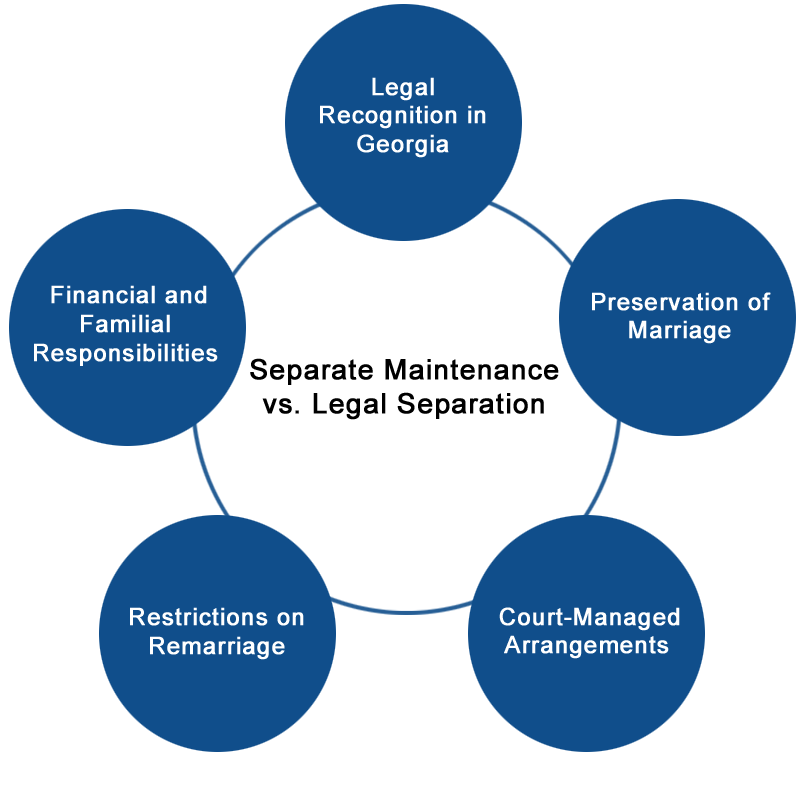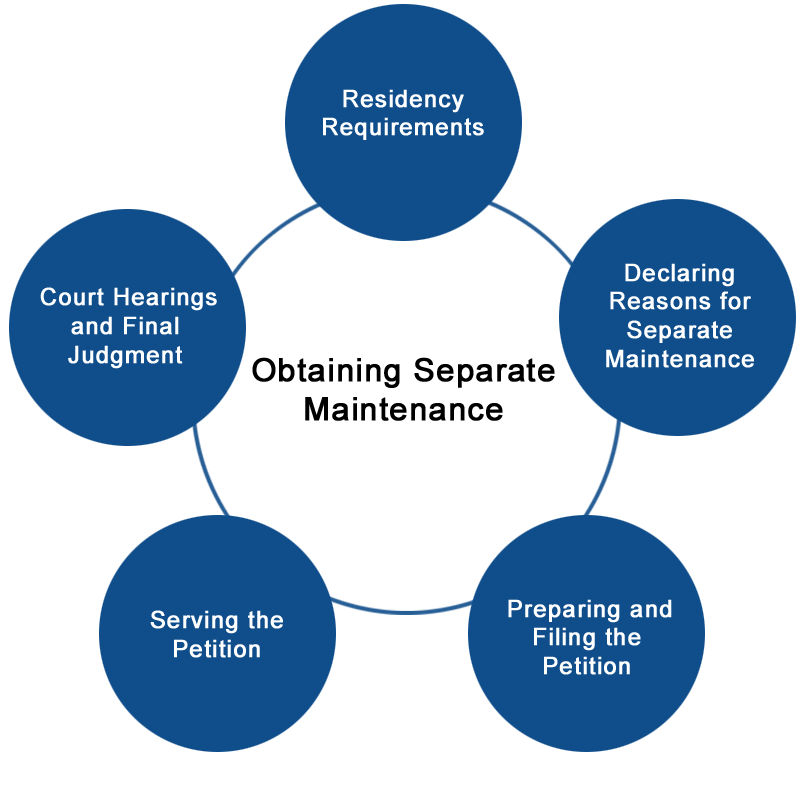Filing for a Legal Separation in Georgia
As a legal concept, “legal separation” allows a couple to address issues ranging from property division and spousal support to child custody, while living separately, without ending the marriage itself. While several states recognize “legal separation” as a legal concept, Georgia does not. Instead, Georgia law allows for a resolution known as a “separate maintenance order.”
When you look at what defines a “separate maintenance order,” you see many similarities to the concept of legal separation. Essentially, a separate maintenance order allows a couple to live separately while resolving important questions about a potential divorce, such as:
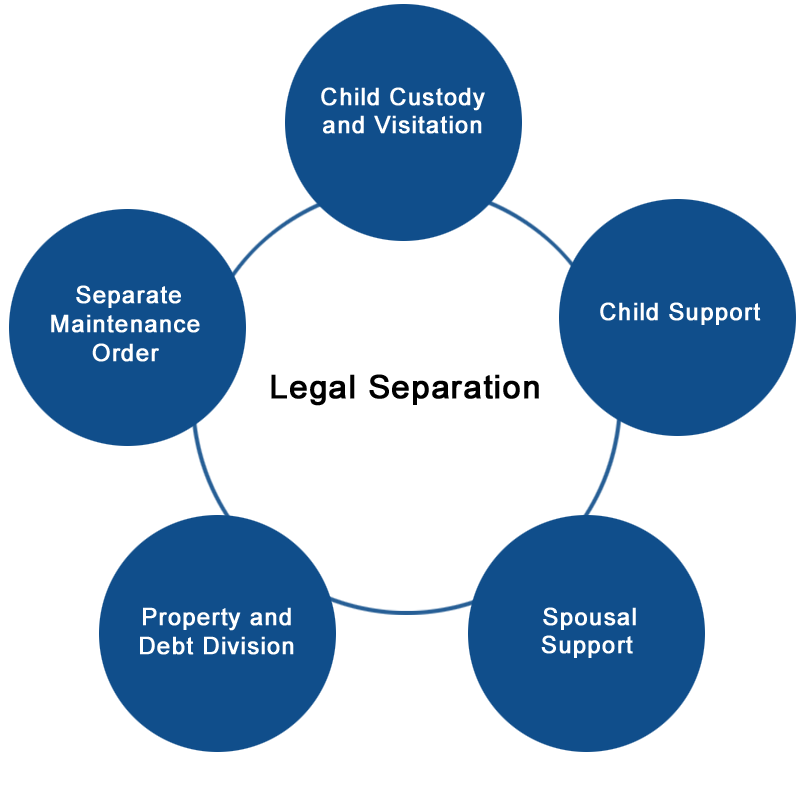 • Which parent will receive custody of the children and what the rules will be regarding visitation?
• Which parent will receive custody of the children and what the rules will be regarding visitation?- • How much child support will be necessary to provide for the children’s wellbeing?
- • How much spousal support one spouse will need to provide to the other?
- • How marital assets, including property and debts, will be divided.
During a separate maintenance order, the couple’s marriage will still be considered legally binding. While the legal process to file for a separate maintenance order is similar to the process of obtaining a divorce, the order does not dissolve the marriage. In this way, separate maintenance is again seen in a similar light as legal separation. However, there are a few key differences.
Separate Maintenance vs. Legal Separation
In Georgia, the difference between separate maintenance and legal separation is more than just semantics. The entire concept of legal separation is not recognized by Georgia law, as it might be in other states, for several reasons.
The specific legal term “separate maintenance” emphasizes the couple’s attempts to negotiate things like financial support and living arrangements while preserving the marriage. With the marriage still legally binding, the couple engaged in separate maintenance is addressing their issues without being “separated” in the sense that they are in other states. This maintenance is managed by the court.
Essentially, separate maintenance creates an environment in which the couple is determining how best to support one another while living apart while preserving the integrity of the marriage. Neither is free to remarry and must maintain their marriage while they establish rules about their financial and familial responsibilities in the future.
The Benefits of Separate Maintenance
Giving both spouses some breathing room by allowing them to live separately helps each avoid conflict and pursue the next steps with minimal emotional entanglement. It signals that both are dedicated to resolving their issues and potentially reconciling through a reversible separation. But, should it come to a divorce, both will enter into it with a clear roadmap for dissolving their union. It can also help couples:
Protect their assets. The process of separate maintenance and divorce can be highly amicable, but can also be devastatingly turbulent. Taking the extra time to calmly divide asses allows both parties to protect their financial interests while details are determined.
Establish boundaries. Particularly during times of separation, the dynamics of a marriage can become murky. This time apart provides an avenue for establishing boundaries, avoiding conflict, and creating a sense of stability that will allow more focus on resolving marital issues.
Protect themselves legally. By establishing a clear legal boundary between spouses, one party can enjoy some level of protection against the consequences of the other’s actions and decisions. This clarity codifies legal responsibilities and rights, creating greater certainty.
Create a more stable family dynamic. By taking the time to create and agree on arrangements for temporary child custody, living situations, and support, children enjoy a more stable environment during an otherwise emotionally traumatic time.
Make better decisions. The separation that comes with a separate maintenance order gives space and most importantly time to reflect on the relationship and consider all the factors that led to the separation. This allows for more considered decision-making free of the daily pressures that come with marriage, whether towards a divorce or a reconciliation.
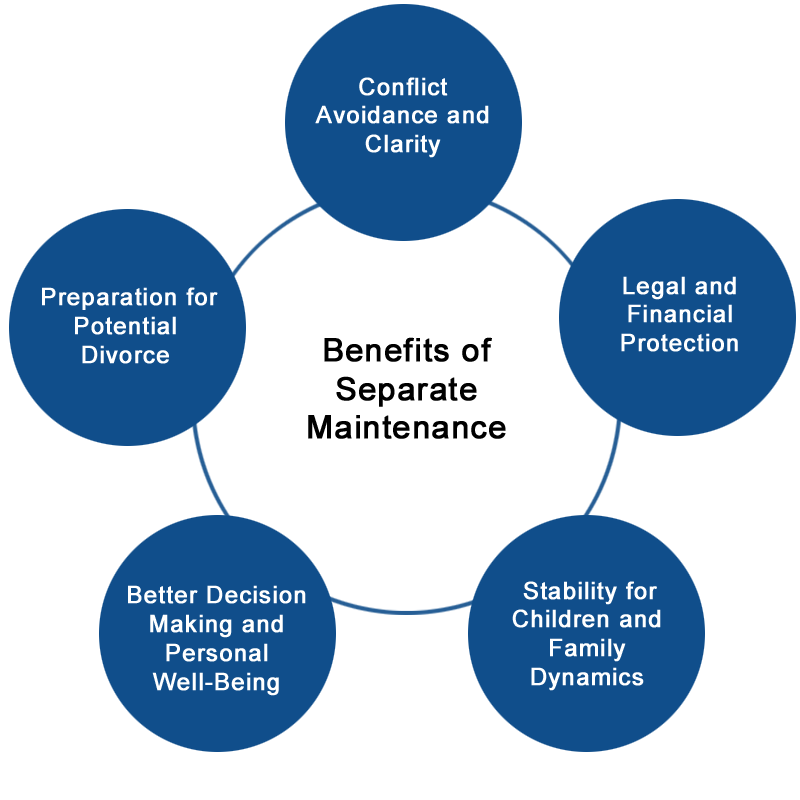 Maintain control over finances. Initiating separation helps prevent financial surprises and create a budget by giving the couple time to set up individual bank accounts, manage and assign responsibility for debts, and secure their incomes.
Maintain control over finances. Initiating separation helps prevent financial surprises and create a budget by giving the couple time to set up individual bank accounts, manage and assign responsibility for debts, and secure their incomes.
Focus on their well-being. Even an amicable separate maintenance order can be a stressful situation. The time apart allows each party to focus on their own emotional and physical well-being.
Provide support for children. Separation can often be far more stressful for children than it is for adults. By isolating them from the more contentious parts of the process, it is far easier to provide for their needs and agree on custody and support.
Prepare for divorce. While a reconciliation is ideal, sometimes divorce is inevitable. If that is the eventual outcome, a separation serves as a preliminary phase, providing time for gathering any documents and exploring legal options.
Protect their privacy. Public disputes can escalate quickly during a divorce. The immediate action of a separate maintenance order allows a couple to address issues in private, giving them more control over their public reputation.
The Process of Obtaining Separate Maintenance in Georgia
There are essentially seven important steps in procuring a separate maintenance order under Georgia law. They are:
1. Fulfill residency requirements. Either you or your spouse will need to prove that you have lived in Georgia for at least six months before the filing date.
2. Declare your reasons for separate maintenance as opposed to divorce. This can include anything from religious considerations regarding divorce to a desire to reconcile or retain health benefits or tax advantages that come with the marriage.
3. Prepare the petition. A petition for separate maintenance must include the names and addresses of both spouses, reasons for seeking separate maintenance, and any specific conditions regarding property division, child support, custody, and so on.
4. File the petition. The petition must be filed in the Superior Court of the county in which your spouse resides. If the spouse’s location isn’t known, you can file in your county. The filing fee will vary by county, and can potentially be waived if you file an affidavit of indigence.
5. Serve the petition. The petition is then served to your spouse through the sheriff’s office, a private process server, or, in some cases, through certified mail. Once the petition has been served, you will need to file the proof of service with the court.
6. Attend any relevant court hearings. Once served, your spouse has the legal right to respond, which may result in hearings to temporarily resolve disputed aspects of the separate maintenance, such as child support or custody.
7. Receive the final judgment. Following any necessary hearings, the court will issue its final judgment covering all aspects of the separate maintenance order.
Frequently Asked Questions: Separate Maintenance in Georgia
How do children impact a separate maintenance order?
The process is largely the same whether children are involved or not. That said, with no children involved, the process is far more straightforward, skipping over any issues of child custody or support and focusing solely on financial, support, and property division questions.
When children are involved, not only must the court address the question of who will retain custody, pay support, and receive visitation, they must do so with an unwavering eye on the best interests of the child. Disagreements that may spring up around children tend to create greater conflict, prolonging the process through additional hearings and mediation.
Much like in a divorce, the provisions regarding child custody and support are legally binding and enforceable by court order.
How long does a separate maintenance order last?
Typically, until the couple chooses to reconcile or until the divorce is finalized. Couples choosing to terminate the marriage can convert their separate maintenance order into a divorce. Those choosing to reconcile can void the separate maintenance order through a mutual agreement, allowing them to resume their marriage.
Do the spouses need to live in separate houses?
Not necessarily. Georgia law allows for a couple to be separated, even while still living under the same roof, so long as they no longer share a bedroom, finances, or engage in marital activities.
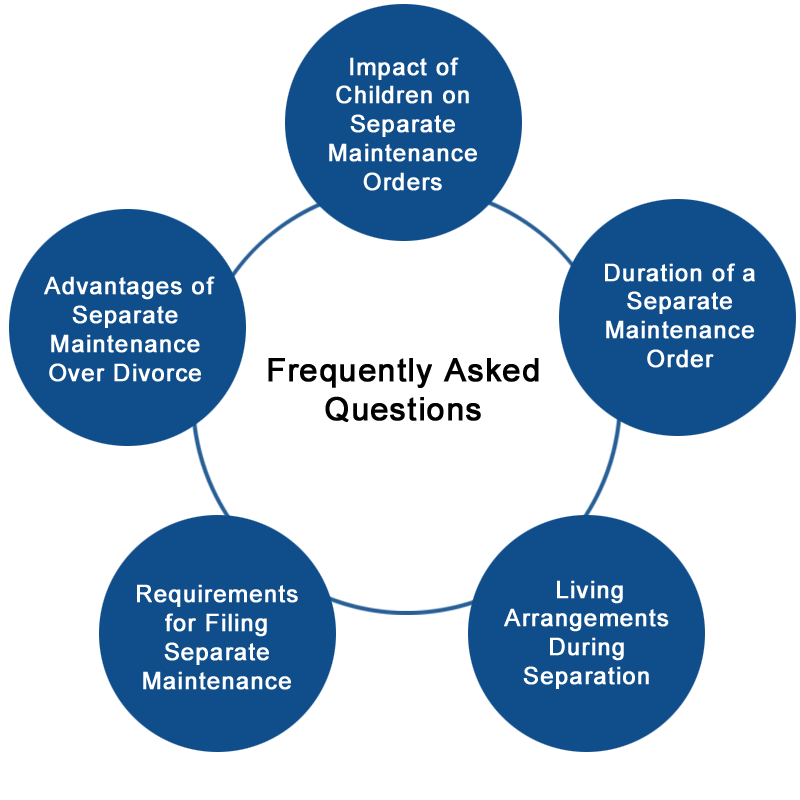 Does Georgia law require a separate maintenance order for a divorce?
Does Georgia law require a separate maintenance order for a divorce?
No, the state does not require you to legally separate before filing for a divorce. For a divorce, a couple living apart or no longer sharing a marital relationship can be considered separated.
What are the requirements for filing a separate maintenance order?
If a couple is legally married but either living apart or not sharing a marital relationship and has not entered into any divorce proceedings, they can file for a separate maintenance order.
What advantages does a separate maintenance order offer over divorce?
There are several reasons why a spouse may pursue a separate maintenance order. Their religious beliefs may prohibit divorce, for example, or there may be financial ties such as insurance or tax benefits that must be maintained. Those couples looking to reconcile can use the time apart as a trial run of a divorce, allowing them to make a clearer decision before proceeding.
Essentially, a separate maintenance order allows a couple to live separately while addressing any custodial or financial issues while remaining legally married.
Can you date during a separate maintenance order?
While you are under a separate maintenance order, you are still considered legally married in the state of Georgia, meaning that any outside relationships could be considered adultery by the court. Particularly in cases where alimony or child custody are in question, dating could hurt your case and your standing with the court.
This differs from a divorce proceeding, in which you are legally allowed to date outside the marriage while the process is ongoing. Even then, certain judges may view these actions in a harsh light, influencing their decisions on property division, alimony, and child custody. Plus, it can create additional tension between spouses and within their social groups.
How long does it take to receive a separate maintenance order?
This depends largely on your circumstances as a couple. If both spouses agree on the terms of the separation, an uncontested separate maintenance order can take 30-60 days from the initial filing to the final judgment. If there are disagreements on terms, a contested separate maintenance order can take several months and potentially a year due to additional court hearings, mediation, and negotiations.
But regardless of how long it takes to receive a final judgment, either spouse can file for temporary orders that allow them to address concerns in the short term, such as financial issues, residence in the family house, and child custody. These orders provide immediate relief of important issues while the case is pending.
 Schedule a Legal Separation Consultation
Schedule a Legal Separation Consultation
Georgia law allows for a separate maintenance order to address crucial issues within the marriage while retaining marital status. That doesn’t mean that addressing those issues will come easily. Since every family law case is unique, and the complexity of a separate maintenance order can vary so wildly, The Claiborne Firm never charges a flat fee. Our retainer is custom-made for your case, based on your requirements and the work it will take to see you get the best result possible.
Our $450 initial consultation gives you immediate peace of mind and gives you the knowledge and insight to provide the best protection for yourself, your family, and your assets. Whether you are looking to reconcile or simply need time to negotiate details before a divorce, a separate maintenance order represents a chance to take a step back and craft a more informed decision. And with this first one-hour consultation with Mr. Claiborne, we can immediately give you the protection you need while building a strategy for your case.
Afterward, you are under no obligation to commit to our representation. We are happy to refer you to a firm that may be better suited to your needs. But at the very least, we’ll have armed you with the knowledge you need to make better decisions, and the peace of mind to see them through.
Call (912) 351-8775 or Contact Us Online

